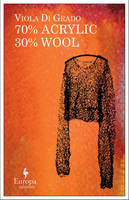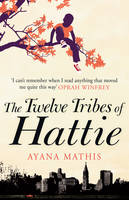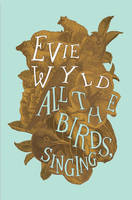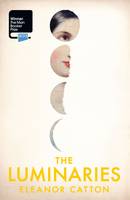I love end-of-year list time, because it’s a chance to reflect on the best moments. I read over 150 books this year, which I’m sure must be a record for me, and is certainly unusually high. There were plenty of highlights amongst all those books, but I have managed to sift them down to twelve, my usual number for these lists.
You can see my previous best-of-year lists here: 2012, 2011, 2010, 2009. I’ve kept changing the format over the years (ranked or unranked; books from all years, or just the year in question); I’ve settled on including books from all years of publication (as long as I read them for the first time this year); but I think it’s more fun to rank them, so I’m also going to do that. And, taking a leaf from Scott Pack’s book, I’m going to list them in reverse order.
So, here (with links to my reviews) are my Top 12 Books of 2013:

12. Viola Di Grado, 70% Acrylic 30% Wool (2011)
Translated from the Italian by Michael Reynolds (2012)
Of all the books I read in 2013, this may be the one that most thoroughly depicts the real world as a strange and treacherous landscape. This is a novel about the power of language to shape perception, as it depicts a young woman gradually discovering a new way to look at life (and, just possibly, finding love) when she meets a boy who teaches her Chinese.
11. Andrew Kaufman, Born Weird (2013)
This is the third Andrew Kaufman book that I’ve read, and he just gets better and better. Born Weird tells of five siblings who were given ‘blessings’ at birth by their grandmother, which she now plans to undo on her death-bed. Kaufman has a wonderfully light touch with the fantastic: there’s just enough whimsy to illuminate the family story, and there’s real bite when the novel gets serious.
10. Project Itoh, Harmony (2008)
Translated from the Japanese by Alexander O. Smith (2010)
A searching exploration of self-determination and authoritarianism in a future where remaining healthy is seen as the ultimate public good. One of the most intellectually engaging books I read all year.
9. Colm Tóibín, The Testament of Mary (2012)
Chalk this one up as the book I liked that I wasn’t expecting to. A short but powerful character study of a mother becoming distanced from her son as he is swept away by social change and the great tide of story. This would have been my second choice for the Man Booker Prize. (My first choice? That’s further down/up the list.)
 8. Ayana Mathis, The Twelve Tribes of Hattie (2012)
8. Ayana Mathis, The Twelve Tribes of Hattie (2012)
A wonderfully fluid composite portrait of an African-American family making their way in the North across the twentieth century. Just recalling the range and vividness of this novel makes me want to read the book again.
7. Sam Thompson, Communion Town (2012)
Ten story-chapters that make the same fictional city seem like ten different places. Communion Town depicts the city as an environment crammed with stories, each vying for the chance to be told. It’s invigorating stuff to read.
6. Mohsin Hamid, How to Get Filthy Rich in Rising Asia (2013)
With one of the strongest voices I’ve encountered all year, this is a nuanced account of a man’s pragmatic rise from childhood poverty to business success – with a keen sense that there are costs to be borne along the way. The second-person narration, which could so easily have been a gimmick, works beautifully.

5. Evie Wyld, All the Birds, Singing (2013)
It has been really exciting over the last five years to see fine writers of my age-group emerge and establish names for themselves. Evie Wyld is one such writer; her debut was on my list of favourite books in 2009, and now here’s her second novel. Wyld remains a superb writer of place, in her depiction both of the English island where sheep farmer Jake Whyte now lives, and of the Australia that Jake fled. I also love how elegantly balanced this novel is, between the volatile past and the present stability that’s now under threat.
4. Alina Bronsky, The Hottest Dishes of the Tartar Cuisine (2010)
Translated from the German by Tim Mohr (2011)
Here’s the most memorable character of the year for me: the gloriously ghastly Rosa, who will do anything for her family if it suits her, and will do anything to them if it suits her better. This book is a joy – blackly hilarious, with a bittersweet sting.
3. Shaun Usher (ed.), Letters of Note (2013)
My non-fiction pick of the year. This is a lavish collection of facsimile letters, which is both beautiful to look at, and a window on very personal aspects of history.
2. Jess Richards, Cooking with Bones (2013)
Jess Richards’ work was my discovery of the year: Cooking with Bones is a magical novel that defies easy summary; but it includes a girl who doesn’t know who she wants to be, when all she can do is reflect back the desires of others; supernatural recipes; and one of the most richly textured fictional worlds I’ve come across in a long time. More fool me for not reading Richards’ debut, Snake Ropes, last year; but at least I have the wonderful promise of that book to come.
 1. Eleanor Catton, The Luminaries (2013)
1. Eleanor Catton, The Luminaries (2013)
Once in a while, a book will come along that changes you as a reader, affects you so deeply that the experience becomes part of who you are. Eleanor Catton’s The Rehearsal was like that for me, which is why it topped my list of books read in 2009. With The Luminaries, it has all happened again. Several months after reading it, I am in awe at the novel’s range and richness; yet I feel that I’ve still glimpsed only a fraction of what Catton has achieved in the book. I was overjoyed at her Man Booker win, and can only hope that it will bring Catton’s work to the attention of as many people as possible. My wish for all readers is that they find books which mean as much to them as a work like The Luminaries means to me.
Now, what about you? What are your favourite books of the year? Also, if you’ve read any on my list, let me know what you thought.
Like this:
Like Loading...




 It’s been a good few years since I read The Reluctant Fundamentalist, but I can still recall the experience quite vividly. What lingers most in my memory, though, more so than any details of the plot, is the way it is told: that measured, reasonable voice telling its story to a stranger at a Lahore café.
It’s been a good few years since I read The Reluctant Fundamentalist, but I can still recall the experience quite vividly. What lingers most in my memory, though, more so than any details of the plot, is the way it is told: that measured, reasonable voice telling its story to a stranger at a Lahore café.
Recent Comments